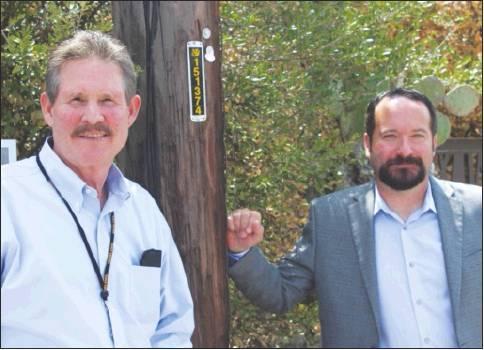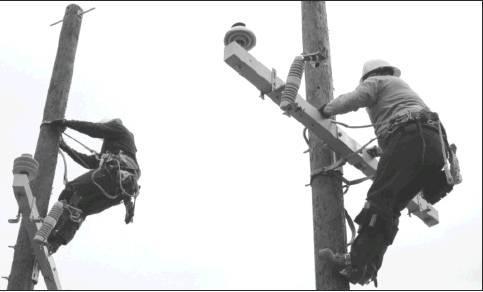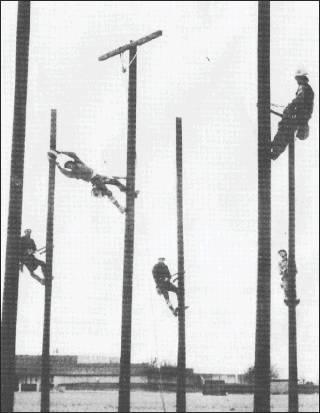PEC Linemen keeping the lights on
It’s pouring rain outside. Lightning flashes and thunder rattles the windows. Then, your power goes out.
Before long there are headlights and a large white truck. A couple people get out and one heads up the power pole. You’re probably thinking these guys must be nuts to be messing around with electricity in this kind of weather.
Soon the lights flicker back on and the digital clocks start blinking.
Welcome to the world of the Pedernales Electric Cooperative linemen.
On average, PEC linemen will have the power back on within 54 minutes after an outage is reported, says Wayne McKee, PEC’s vice president of operations and a former lineman.
The term “lineman” is not entirely accurate. PEC has 180 linemen and one linewoman. The ages of PEC linemen range fro 19 to 70.
The linemen are broken down into two groups. One makes service calls and the other concentrates on construction.
Not everyone is cut out to be a lineman. “Some of the latest numbers show a 50 percent drop-off rate,” says Wayne.
Going to college
Once hired, the workers go to “Lineman’s College” where they learn the trade. One of the training exercises is to climb a 40-foot power pole and toss around a football or basketball. “The goal is to make them feel comfortable up there. The natural inclination is to hold on. So when they throw the ball they have to take their hands off the pole,” explains Wayne.
In the old days, a lineman would climb a pole and toss a pack of cigarettes into the air. The goal was to get down before the cigarettes hit the ground. One of the competitions in the annual Lineman’s Rodeo is to climb a pole with an egg in your mouth and not break the egg. Wayne figures it should take an experienced lineman about 20 seconds to get up and down a 40-foot pole.
PEC linemen made a strong showing in the 2019 Texas Lineman’s Rodeo in Seguin, taking home 18 trophies in categories such as hurt-man rescue, photocell changeout, pole climbing, and the barbecue cook-off.
A lineman serves an apprenticeship for four years and then graduates to journeyman. An apprentice earns around $20 an hour; a journeyman more than $40.
Basically, linemen are on call 24/7. When a big storm hits, the whole group is mobilized. PEC has a large area to cover, stretching from Lampasas to Canyon Lake and from Junction to the Austin area.
Today, it’s all about safety. Kurt Buckner, also a former lineman and now PEC’s director of regional operations in Kyle (which serves the Wimberley area), says PEC has had 1.5 million hours without lost time for an accident. With modern safety gear, a lineman is more likely to twist an ankle or fall getting to a pole than actually getting hurt up on it. Kurt says the No. 1 safety concern these days is driving to get to an outage.
It wasn’t always that way. Back in the 1930s, when lines were being strung across the country, four out of every 10 linemen were killed on the job, most electrocuted. The job was so dangerous it was impossible to get life insurance. The power companies had to establish their own “widow’s funds.”
Safety gear
A typical power line carries 25,000 volts and the rubber gloves the linemen wear are rated up to 30,000 volts. “You can go up and touch a live wire with these gloves and you are protected,” explains Kurt. The linemen also wear heavy-duty rubber boots and rubber sleeves.
The federal Occupational Safety and Health Administration (OSHA) requires that a lineman get his gear on, climb a pole, “rescue” a dummy that simulates an injured worker and get down in under four minutes. Some of the star linemen who compete in the rodeo can do it in two minutes.
There’s one hard and fast rule: pay attention to your job. “There’s zero tolerance for horseplay,” says Kurt. During an emergency a lineman can work up to 16 straight hours, then they have to get some rest.
It used to be a lineman just had to have a strong back and a certain amount of fearlessness. That has changed. Technology has made a lineman’s job more complicated.
“When I first started they just said ‘we need your back, not your brain’,” says Wayne with chuckle. “They wouldn’t even give me a pencil.”
When there’s a disaster, most linemen not only expect to be called, but want to be called. “These people are very dedicated to the trade,” says Wayne.
When the Memorial Day flood hit Wimberley in 2015, more than 1,000 outages were reported. Except when equipment was actually washed away, power was restored in a few days.
There are no physical tests, the nature of the job makes sure that a lineman is fit.
Headquartered in Johnson City, PEC has about 800 employees. The co-op acts as a kind of power retailer. It buys the power from a variety of sources and distributes it to customers. In order to travel long distances through wires, the voltage is pumped up. When it hits one of PEC’s substations — like the one across from Ace Hardware on FM2325 or on RR12 at the Junction — the power is reduced so it can operate your household appliances.
“Most of the public doesn’t know what a lineman does,” says Wayne.
Adds Kurt: “There’s an extreme amount of pride in what we do.”




